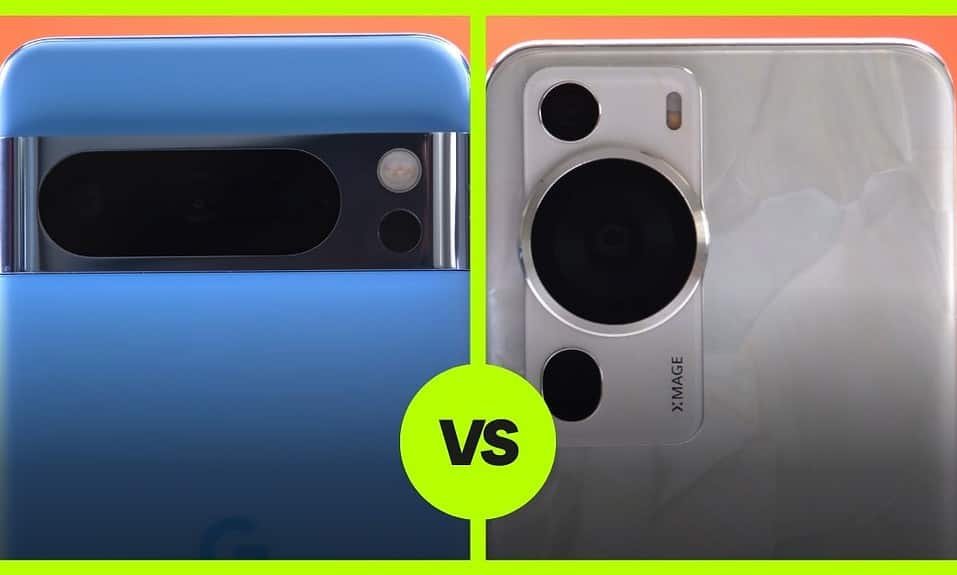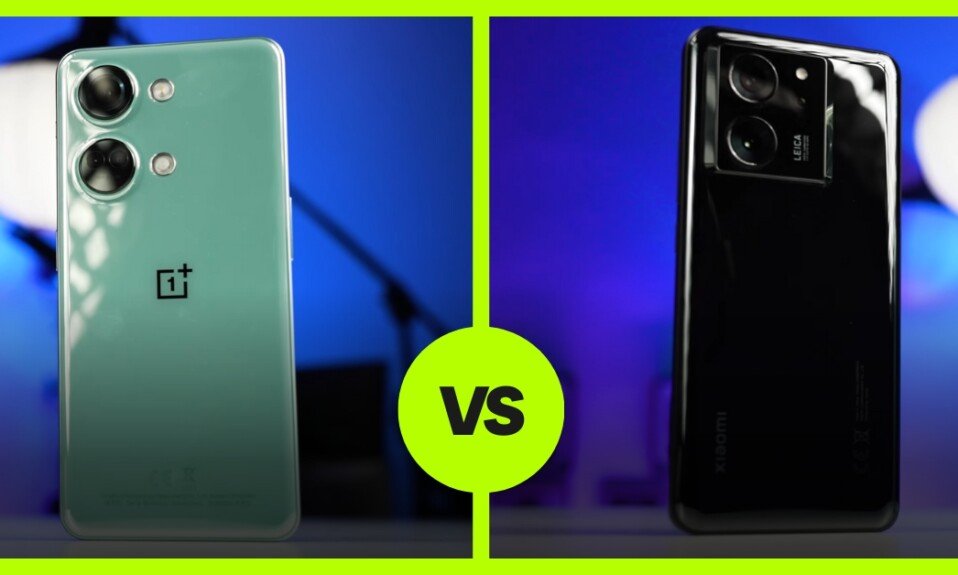Google Pixel 8 Pro vs Huawei P60 Pro. Today’s showdown features two of the most talked-about devices: the Google Pixel 8 Pro and the Huawei P60 Pro.
Both phones are highly regarded in the Android market, making it essential to find the best fit for individual needs. We will be examining and comparing various aspects of these two phones to help you make an informed decision.
Table of Contents
Design: A Tale of Textures and Tones
At first glance, the Google Pixel 8 Pro and Huawei P60 Pro offers distinct aesthetics. The Pixel 8 Pro’s camera array is horizontally aligned, while the P60 Pro opts for a vertical setup in the top left corner. Both house three powerful sensors and an LED flash. However, the Pixel 8 Pro includes a temperature sensor, adding a functional edge to its design.
The rear camera module of the Pixel 8 Pro is constructed from polished steel, which can attract fingerprints and is more prone to scratches. In contrast, the Huawei P60 Pro’s camera module is made of glass with some steel accents, giving it a sleek look and making it more resistant to smudges.
Thanks to its glass construction, the Huawei P60 Pro is less prone to fingerprint smudges compared to the Pixel 8 Pro’s polished steel rear camera module.
When it comes to size and weight, they are quite comparable, with the Pixel 8 Pro being slightly heavier. They both enjoy IP68 dust and water resistance, ensuring durability and longevity.
The Pixel 8 Pro weighs 213 grams, while the P60 Pro weighs 200 grams. In terms of dimensions, the Pixel 8 Pro measures 8.8mm in thickness, 76.5mm in width, and 162.6mm in height, while the P60 Pro measures 8.3mm in thickness, 74.5mm in width, and 161mm in height. Both phones have similar dimensions, but the P60 Pro is slightly lighter and more compact.
Display: A Visual Feast
The Pixel 8 Pro flaunts a 6.7-inch screen, while the P60 Pro is close behind with a 6.67-inch display. Both are OLED panels, promising vibrant colors and deep blacks.

The Google Pixel 8 Pro has a pixel density of 489 pixels per inch, while the Huawei P60 Pro has a pixel density of 444 pixels per inch. This means that the Pixel 8 Pro offers slightly sharper visuals. The Pixel 8 Pro’s slightly higher pixel density and resolution might appeal to pixel peepers, but in real-world usage, both screens are exceptionally bright, colorful, and responsive.
The Pixel 8 Pro has a resolution of 1344 x 2992 pixels, while the P60 Pro has a resolution of 1220 x 2700 pixels.
The screens’ refresh rates stand at 120 Hz, making every interaction smooth and fluid. A notable design choice is the slight curvature of the P60 Pro’s screen edges, which might appeal to those who enjoy a more immersive display.
The Pixel 8 Pro has a typical brightness of 1600 nits, while the P60 Pro has a typical brightness of 1800 nits. However, the Pixel 8 Pro has a peak brightness of 2400 nits in outdoor conditions, providing better visibility in bright sunlight.
Overall, both phones offer exceptional displays with rich colors and high image quality. The Pixel 8 Pro has a slight advantage in terms of pixel density, but the P60 Pro compensates with a higher peak brightness.
Camera: Capturing Moments in Style
The Google Pixel 8 Pro features a triple rear camera setup with a 50-megapixel main sensor, a 48-megapixel ultra-wide-angle sensor, and a 48-megapixel telephoto sensor with 5x optical zoom. On the other hand, the Huawei P60 Pro also has a triple rear camera setup consisting of a 48-megapixel main sensor, a 13-megapixel ultra-wide-angle sensor, and a 48-megapixel telephoto sensor with 3.5x optical zoom.

The Pixel 8 Pro’s camera interface is intuitive, offering seamless switching between photo and video modes and a variety of lens choices at your fingertips. The P60 Pro, with its physical aperture control, gives a nod to more traditional photography, offering depth and professionalism to your shots.
In terms of front cameras, both phones offer high-resolution sensors capable of recording 4K video, ensuring that your selfies and vlogs are of the highest quality.
Performance: Power at Your Fingertips
The Google Pixel 8 Pro features the Tensor G3 processor with 12GB of RAM, while the Huawei P60 Pro is equipped with the Snapdragon 8 Plus Generation 1 processor with either 8GB or 12GB of RAM. Both devices have powerful processors and ample RAM for smooth performance.
In daily usage, both phones provide a seamless experience for tasks such as browsing the internet, using social media, and making calls. The Huawei P60 Pro may offer slightly better performance due to its Snapdragon 8 Plus processor.
Battery Life
The Google Pixel 8 Pro has a battery capacity of 5050mAh, while the Huawei P60 Pro has a slightly smaller capacity of 4815mAh. Both phones offer sufficient battery life for daily usage, but the Pixel 8 Pro has a slight advantage in terms of capacity.
The Pixel 8 Pro supports 30W charging and does not include a charger in the box, which means you’ll need to purchase a compatible charger separately. On the other hand, the Huawei P60 Pro supports 88W charging and includes a fast charger in the box, allowing for significantly faster charging speeds. With the P60 Pro, you can charge your phone to 50% in just 15 minutes and achieve a full charge in approximately 30 minutes.
The Pixel 8 Pro supports 23W wireless charging, while the P60 Pro offers faster 50W wireless charging. Both phones are compatible with wireless chargers, providing convenient charging options.
Software: Smooth, Seamless, and Smart
The Google Pixel 8 Pro runs on Android 14, the latest version of the operating system, while the Huawei P60 Pro operates on MIUI 13.1. Both operating systems provide a user-friendly experience, but the Pixel 8 Pro benefits from the latest updates and features offered by Android 14.
It’s worth mentioning that while Huawei devices do have access to Android, there may be some limitations when it comes to using Google services. Although you can install Google apps on the Huawei P60 Pro, it may require additional steps to ensure the same seamless experience as on the Pixel 8 Pro.
The Google Pixel 8 Pro is known for its advanced AI capabilities, particularly in the camera app. With features like object removal and facial expression changes in Google Photos, the Pixel 8 Pro offers unique AI-driven functionalities that can enhance your photography experience.
Price
The Google Pixel 8 Pro is currently priced at $799 for the 128GB version, $859 for the 256GB version, $979 for the 512GB version, and $1199 for the 1TB version. On the other hand, the Huawei P60 Pro is priced at approximately $1000, depending on the region and retailer.
Conclusion!
Ultimately, the choice between the Google Pixel 8 Pro and the Huawei P60 Pro comes down to personal preference. Do you value a sleek design and a pure Android experience with the latest AI features? Then the Pixel 8 Pro might be your match. Or do you prefer a distinctive design, versatile camera capabilities, and rapid charging? Then consider the Huawei P60 Pro.
Both phones are top-tier devices capable of meeting a wide range of needs and preferences. Consider what features matter most to you, and choose accordingly. Whichever you pick, you’ll be getting one of the best Android experiences available.
Here is a summary of the key differences and strengths of each device:
- Huawei P60 Pro Design: Sleek with a smudge-resistant glass rear camera module, offering a unique aesthetic.
- Google Pixel 8 Pro Design: Features polished steel rear camera module with a horizontal alignment.
- Display Quality: Both phones have vibrant, high-quality displays; Pixel 8 Pro has higher pixel density, while P60 Pro has higher peak brightness.
- Camera Performance: Pixel 8 Pro excels in video recording and AI features; P60 Pro is notable for warm color interpretation, zoom capabilities, and photographic versatility.
- Battery Capacity and Charging: P60 Pro leads with a larger battery and faster charging, offering extended use and convenience.
- Software: Pixel 8 Pro benefits from the latest Android 14 updates and features, while P60 Pro runs on MIUI 13.1 and might need extra steps for optimal Google services integration.



